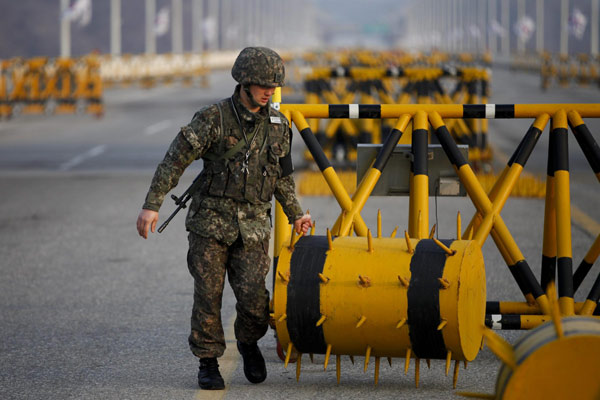Pyongyang ends last project with Seoul
Updated: 2013-04-09 08:05
(China Daily/Agencies)
|
||||||||
Pyongyang suspended its sole remaining major project with Seoul on Monday after weeks of threats against the United States and the Republic of Korea, as Russian President Vladimir Putin said any nuclear conflict may make Chernobyl look like a fairy tale.
 |
|
A Republic of Korea soldier sets up a barricade at a checkpoint on the Grand Unification Bridge, which leads to the Republic of Korea, April 8, 2013. [Photo/Agencies] |
Pyongyang said on Monday it will suspend operations at the Kaesong industrial complex, pulling out more than 53,000 workers and moving closer to severing its last economic link with the ROK.
Tension has been rising since the United Nations imposed new sanctions against the Democratic People's Republic of Korea in response to its third nuclear test in February. Pyongyang has been further angered by weeks of joint military exercises by ROK and US forces and threatened both countries with nuclear attack.
Putin said conflict on the peninsula could cause greater devastation than the Chernobyl nuclear disaster in 1986.
"I would make no secret about it, we are worried about the escalation on the Korean Peninsula, because we are neighbors," he told a joint news conference with German Chancellor Angela Merkel during a visit to a trade fair in Germany.
"And if, God forbid, something happens, Chernobyl which we all know a lot about, may seem like a child's fairy tale. Is there such a threat or not? I think there is. ... I would urge everyone to calm down ... and start to resolve the problems that have piled up for many years there at the negotiating table."
UN Secretary-General Ban Ki-moon said Pyongyang could not go on "confronting" the authority of the Security Council and challenging the international community.
"I sincerely hope that they will fully comply with the relevant Security Council resolutions. This is an urgent and earnest appeal from the international community, including myself."
Kim Yang-gon, secretary of the Central Committee of the Workers' Party of Korea, was quoted by the official KCNA news agency as saying that authorities will "temporarily suspend the operations in the (Kaseong) zone and examine the issue of whether it will allow its (continued) existence or close it".
Last shared link
Seoul, KCNA said, was trying to "turn the zone into a hotbed of war" against Pyongyang.
The DPRK last week barred ROK residents from entering the zone, and its workers had been leaving the zone gradually in the past week as raw materials and food began to run out.
Analysts had suggested that Pyongyang would continue to allow Kaesong to operate as it accounted for some $2 billion in annual trade, with thousands of DPRK residents working in the zone making household goods for 123 ROK companies.
About 475 ROK workers remain in Kaesong. Thirteen factories have stopped operations due to a lack of raw materials, according to Seoul's Unification Ministry.
The zone was the last shared link between the two countries as Pyongyang cut off three telephone "hotlines" and declared that it will not recognize the armistice that ended fighting in the Korean War.
Earlier on Monday, the ROK's defense ministry said Pyongyang does not appear to be preparing for a fourth nuclear test in the near future, based on its reading of activity around the test site. "We found there had been no unusual movements that indicated it wanted to carry out a nuclear test," a spokesman at the ministry said.
ROK Unification Minister Ryoo Kihl-jae said on Monday that he had earlier "misspoken" when he told lawmakers there is an "indication" that Pyongyang is preparing for a nuclear test.
The DPRK authorities told embassies in Pyongyang they could not guarantee their safety from Wednesday - after saying conflict was inevitable amid the joint US-ROK military exercises due to last until the end of the month. No diplomats appear to have left the capital.
Pyongyang has shown no sign of preparing its 1.2 million-strong army for war, but it has moved what appears to be a mid-range Musudan missile to its east coast, according to media reports last week.
Japanese public broadcaster NHK showed aerial footage of what it said were ballistic missile interceptors being deployed near Tokyo in response to Pyongyang's threats and actions.
Reuters-AFP-AP

 Li Na on Time cover, makes influential 100 list
Li Na on Time cover, makes influential 100 list
 FBI releases photos of 2 Boston bombings suspects
FBI releases photos of 2 Boston bombings suspects
 World's wackiest hairstyles
World's wackiest hairstyles
 Sandstorms strike Northwest China
Sandstorms strike Northwest China
 Never-seen photos of Madonna on display
Never-seen photos of Madonna on display
 H7N9 outbreak linked to waterfowl migration
H7N9 outbreak linked to waterfowl migration
 Dozens feared dead in Texas plant blast
Dozens feared dead in Texas plant blast
 Venezuelan court rules out manual votes counting
Venezuelan court rules out manual votes counting
Most Viewed
Editor's Picks

|

|

|

|

|

|
Today's Top News
Boston bombing suspect reported cornered on boat
7.0-magnitude quake hits Sichuan
Cross-talk artist helps to spread the word
'Green' awareness levels drop in Beijing
Palace Museum spruces up
First couple on Time's list of most influential
H7N9 flu transmission studied
Trading channels 'need to broaden'
US Weekly

|

|







